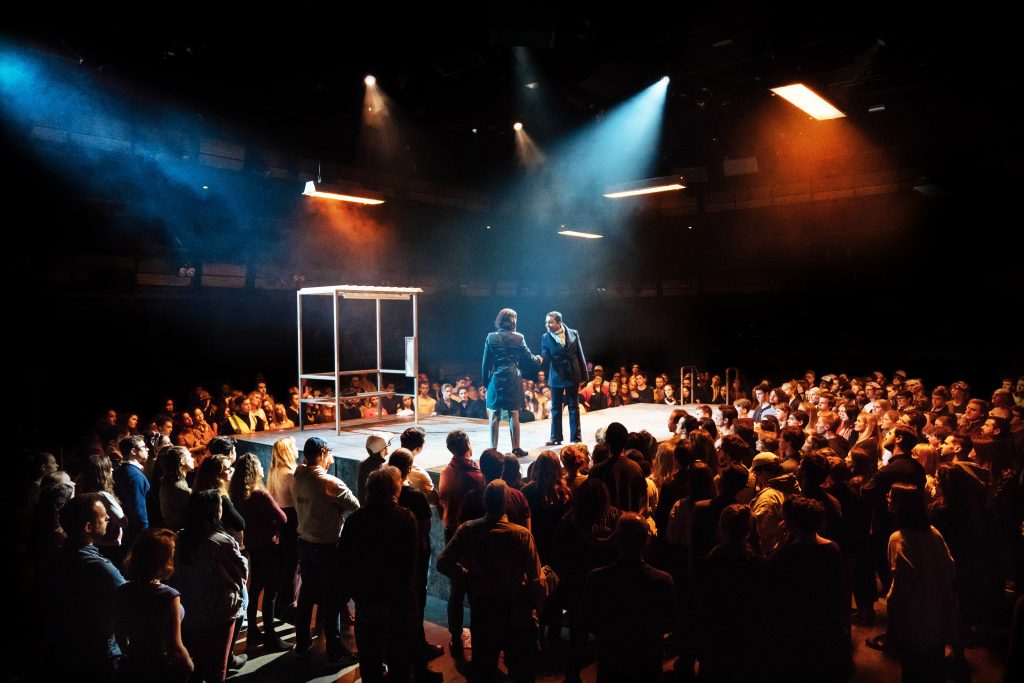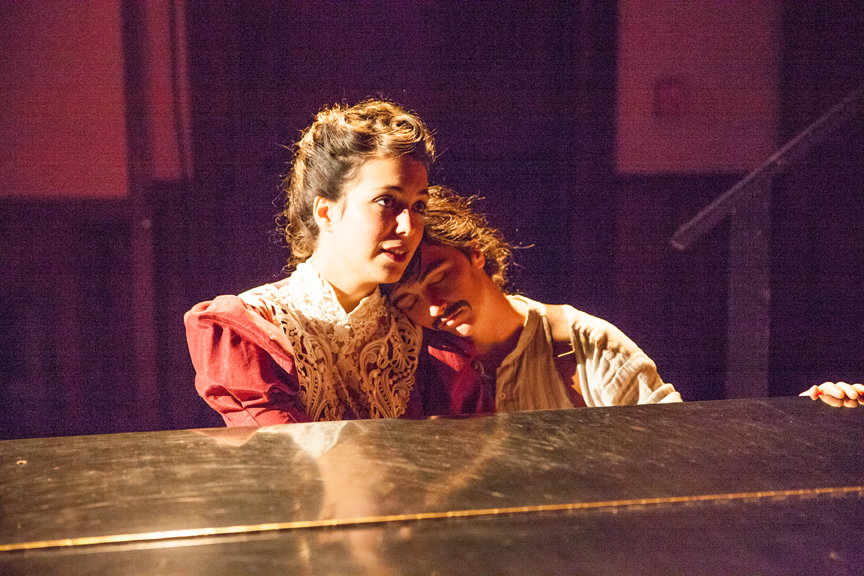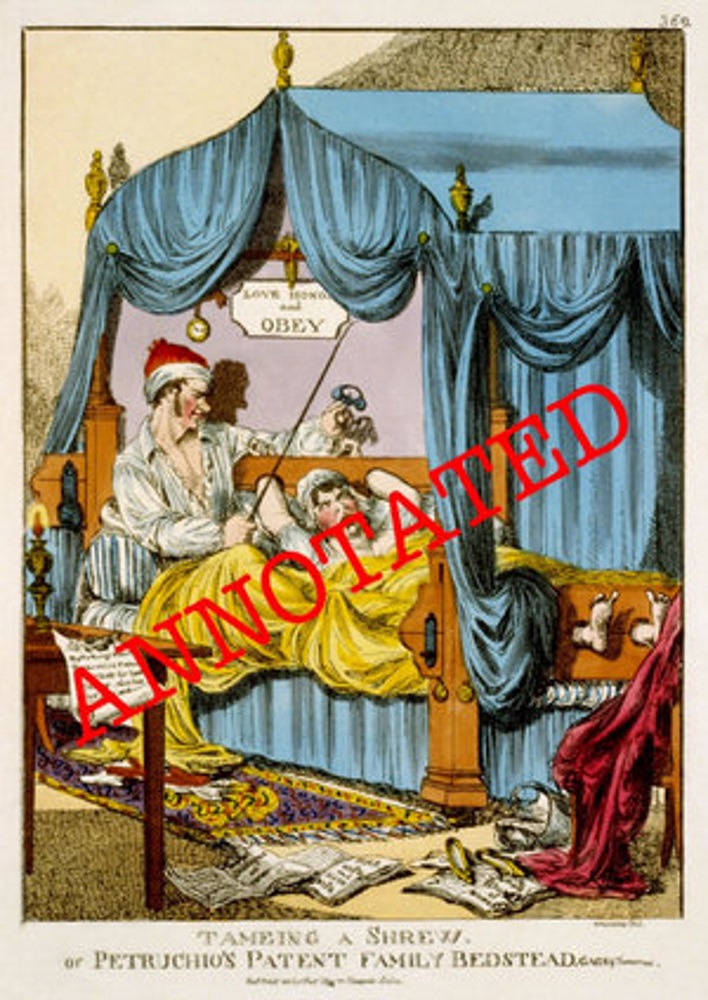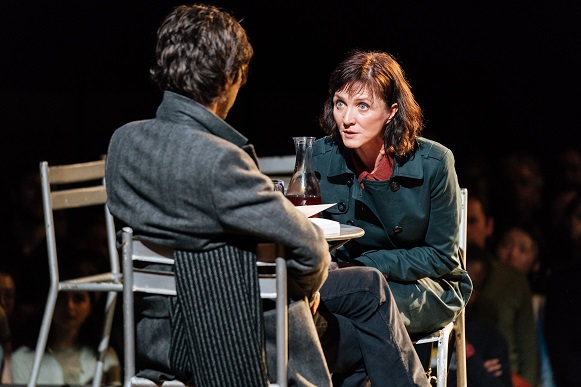Three shows up and down the Valley this weekend put a modern and feminist spin on some classic tales from Shakespeare and the Bible – Wayward Home in Ashfield, The Annotated *Taming* in Turners Falls and Julius Caesar in Amherst.
Wayward Home, weaving the Noah’s Ark story into contemporary migration narratives, is “a musical folktale about a family forced to begin again,” according to the show’s description. “Through original music and fantastical storytelling, an international trio of performers untangles a universal tale of love, loss, and rebirth, and delves into the question, How do we keep going when the world turns upside down?”
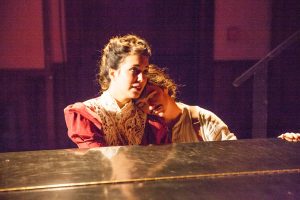 Based on “an archetypal story that rings hauntingly close to today’s reality,” the show is a collaboration between American playwright Maizy Scarpa and Swedish composer Clara Strauch, who share “a fascination with immigration stories, humans’ relationship with nature, and feminist angles on myths.” They are joined onstage by Didrik Soderstrom. The original music is performed live on instruments both traditional (piano, banjo) and found (bells, typewriters, jars of water and more).
Based on “an archetypal story that rings hauntingly close to today’s reality,” the show is a collaboration between American playwright Maizy Scarpa and Swedish composer Clara Strauch, who share “a fascination with immigration stories, humans’ relationship with nature, and feminist angles on myths.” They are joined onstage by Didrik Soderstrom. The original music is performed live on instruments both traditional (piano, banjo) and found (bells, typewriters, jars of water and more).
It plays Thursday and Friday, April 19-20, at the First Congregational Church of Ashfield, presented by Jeannine Haas’s Pauline Productions. Haas told me that when she first saw the piece, she responded immediately to its “fresh energy, abundant talent and drive … that sizzle that gets me excited as an audience member.”
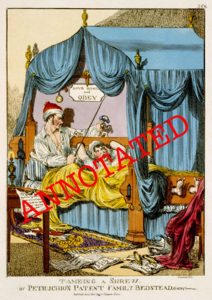 The Annotated *Taming* or, Out of the Saddle, Into the Dirt takes Shakespeare’s perennially controversial comedy and puts the Shrew in the saddle – or tries to. Toby Bercovici’s adaptation – a thorough recasting, really – is also a musical, with original songs by the duo Old Flame, Emma Ayres and Sam Perry.
The Annotated *Taming* or, Out of the Saddle, Into the Dirt takes Shakespeare’s perennially controversial comedy and puts the Shrew in the saddle – or tries to. Toby Bercovici’s adaptation – a thorough recasting, really – is also a musical, with original songs by the duo Old Flame, Emma Ayres and Sam Perry.
Real Live Theatre presents a staged reading on Saturday, April 21, 7pm at the Northampton Center for the Arts’ new home in the Northampton Arts Trust building at 33 Hawley Street. The evening is augmented by a separate Old Flame set.
In Shakespeare’s Taming of the Shrew, Kate, the “shrewish” (that is, fiercely independent) daughter of a wealthy burgher, is married off to the gold-digging Petruchio, who sets out to “tame” her into an obedient wife. Author/director Toby Vera Bercovici says her variant “takes a look at the play in the context of the contemporary political and cultural landscape, most specifically as it relates to the treatment of women.”
The subtitle is drawn from a line in Shakespeare’s play, describing a disaster on horseback for the combative bride and groom. Bercovici updates that image by opening her version with a stageful of Hillary Clintons awaiting inauguration, only to be attacked by a posse of men and carried off to a metaphorical prison of the patriarchal past – “a phenomenon,” Bercovici observes, “that happens with many oppressed groups and the people in power who feel threatened by them.”
Julius Caesar is one of the most macho plays in Shakespeare’s male-heavy canon – only two women in the cast, both of them in and out before the thing is half over. But a new production puts many more women onstage, one of them in the play’s most macho role.
Performed in the Bridge Theatre, London’s newest playhouse, it’s beamed stateside (and around the world) as part of the NT Live series of HD-satellite broadcasts from British stages. There’s a screening at the Amherst Cinema this Saturday, April 21, at 12:30pm.
The Brits are way ahead of us in cross-gender and “color-blind” casting. Here, Caesar’s and Brutus’s wives are both women of color, and with the exception of the central males, all of them white, the show is cast race- and gender-blind.
 Or maybe not so blind. In Nicholas Hytner’s thrilling production, there’s no explicit thematic overlay that transforms ancient Rome into a multicultural, non-patriarchal society. But the very fact that half the cast are not white males – from the Senators who conspire to assassinate Caesar to the Roman citizens who swarm to whoever is the hero of the hour – serves as an implicit What if? and Why not? within this timeless tale.
Or maybe not so blind. In Nicholas Hytner’s thrilling production, there’s no explicit thematic overlay that transforms ancient Rome into a multicultural, non-patriarchal society. But the very fact that half the cast are not white males – from the Senators who conspire to assassinate Caesar to the Roman citizens who swarm to whoever is the hero of the hour – serves as an implicit What if? and Why not? within this timeless tale.
Now about those Roman citizens. The other striking thing about this production is its total-immersion framework. The Bridge’s ultra-flexible space has been transformed into an open disc where stages rise from the floor and are surrounded by the audience, who become the Roman populace, up-close observers of the swirling action.
 It’s a bit of a gimmick, but it matches the play’s epic scale and recalls the theater of Shakespeare’s day – those groundlings who are resurrected today in the new Globe Theatre just along the Thames. This is no facsimile production, though, with the actors in modern dress and the air around them shattered by rock’n’roll and the sounds of modern warfare.
It’s a bit of a gimmick, but it matches the play’s epic scale and recalls the theater of Shakespeare’s day – those groundlings who are resurrected today in the new Globe Theatre just along the Thames. This is no facsimile production, though, with the actors in modern dress and the air around them shattered by rock’n’roll and the sounds of modern warfare.
In the near-perfect cast, I most admired Ben Whishaw as a bookish, bespectacled Brutus, consumed by conscience, and Michelle Fairley as Cassius – a female Cassius, who gives that conspirator’s “lean and hungry look” the predatory assurance of a lioness. David Calder’s Caesar has an emperor’s arrogance shaded with an old man’s fragility, but I found David Morrissey not only too old for Marc Antony, the lightweight turned hero by events, but not up to the character’s chameleon shifts of temperament.
Wayward Home photo by Katie Veltum Cartwright
Julius Caesar photos by Manuel Harlan
If you’d like to be notified of future posts, email StageStruck@crocker.com

